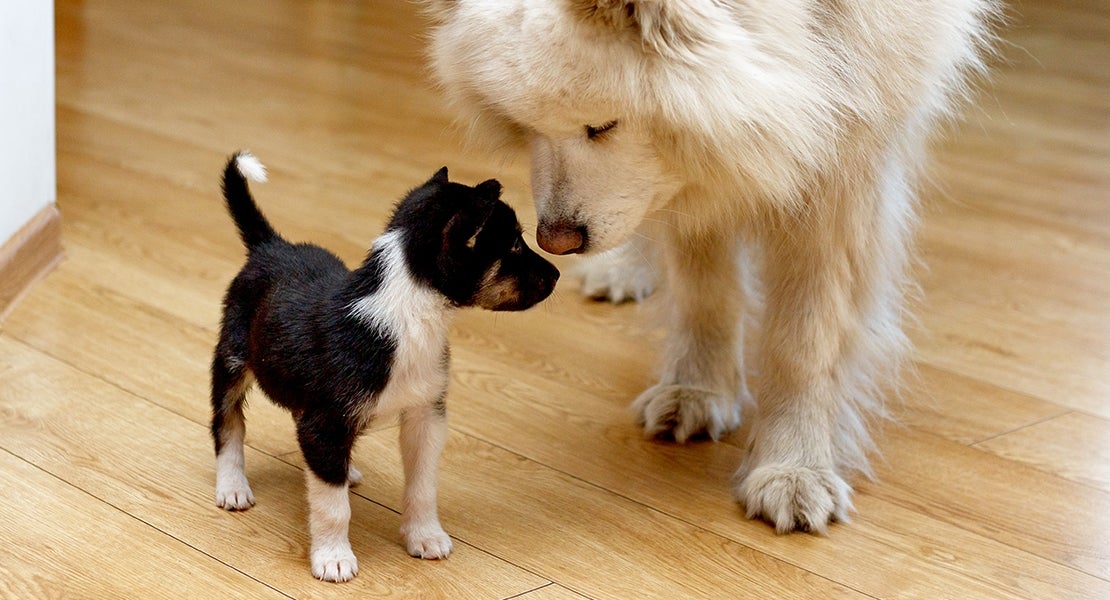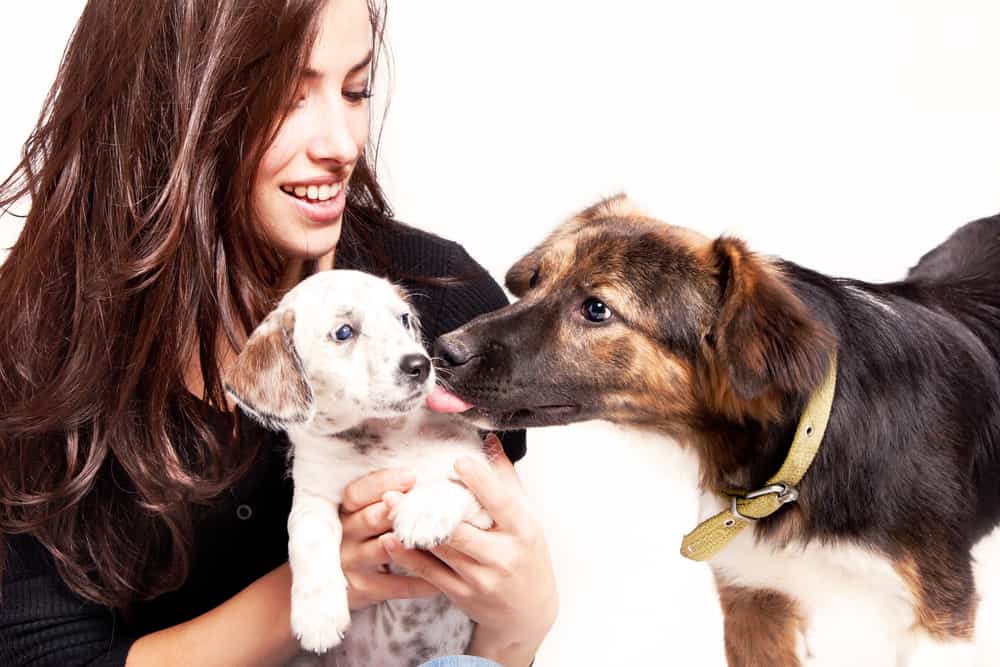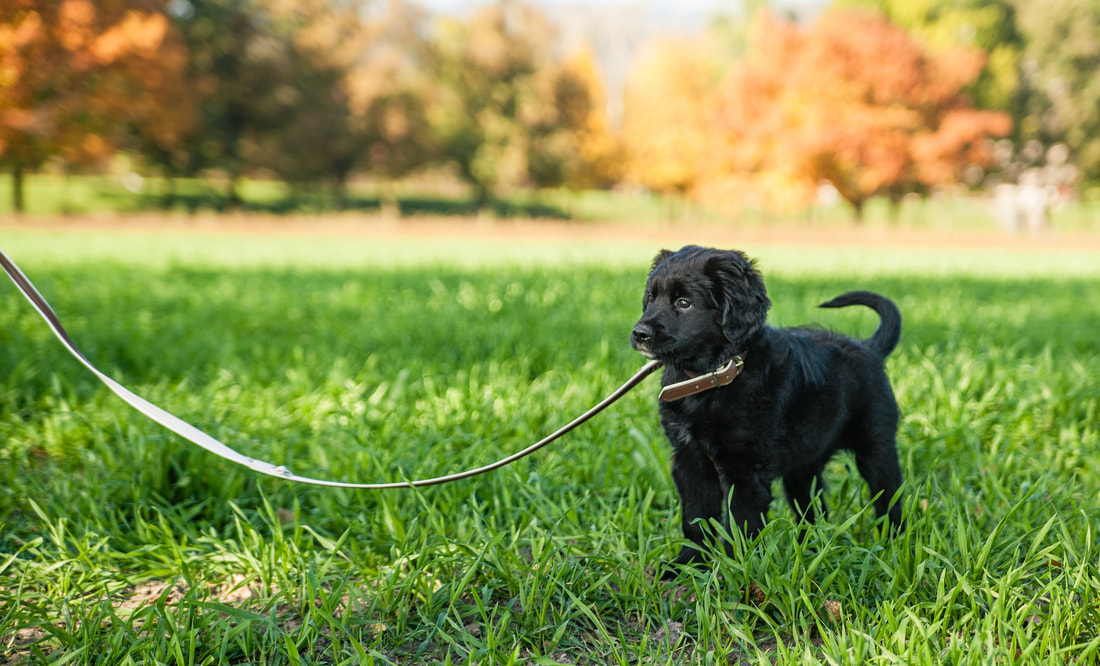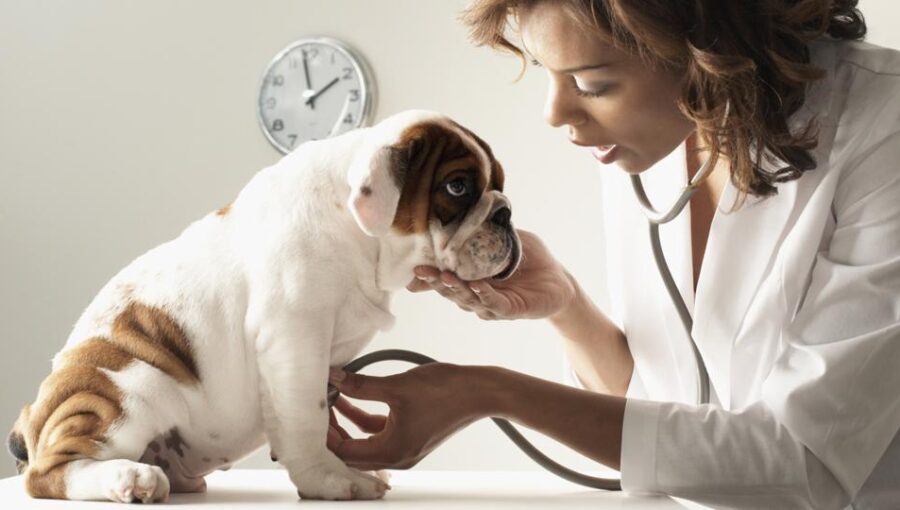|
Start Early: Begin potty training as soon as you bring your puppy home. Puppies have small bladders and limited control over their bodily functions, so they'll need to go frequently. Set a schedule for regular potty breaks, including first thing in the morning, after meals, after playtime, and before bedtime. Establish a Routine: Consistency is key to successful potty training. Take your puppy outside to the designated potty area at the same times each day. Use a consistent command, such as "go potty" or "do your business," to encourage them to eliminate. Choose a Potty Spot: Designate a specific area in your yard where you want your puppy to go potty. Take them to this spot every time they need to eliminate. The scent will help reinforce the behavior, making it easier for them to understand where they should go. Use Positive Reinforcement: Praise and rewards are powerful tools in potty training. When your puppy successfully goes potty outside, shower them with praise and offer a tasty treat as a reward. Positive reinforcement will encourage them to repeat the desired behavior. Monitor Supervision: Keep a close eye on your puppy when they're indoors, especially during the early stages of potty training. Watch for signs such as sniffing, circling, or squatting, which indicate they need to go potty. Immediately take them outside to the designated spot if you notice any of these behaviors. Limit Freedom Indoors: Until your puppy is fully potty trained, it's essential to restrict their access to certain areas of the house. Use baby gates or close doors to confine them to a smaller space where accidents are easier to clean up. As they become more reliable, gradually expand their freedom indoors. Clean Accidents Promptly:
Accidents are inevitable during the potty training process. When they occur, clean up the mess promptly and thoroughly to remove any traces of scent that might attract your puppy back to the same spot. Use an enzymatic cleaner specifically designed for pet messes. Be Patient and Persistent: Potty training takes time and patience. Remember that accidents are a normal part of the learning process, so try not to get frustrated with your puppy. Stay consistent with your training routine, and eventually, they will learn where and when to go potty. Adjust the Schedule: As your puppy grows older, their bladder control will improve, and they'll be able to hold it for longer periods. Adjust the potty schedule accordingly, gradually increasing the time between breaks. However, continue to provide regular opportunities for potty breaks throughout the day. Celebrate Success: When your puppy is consistently going potty outside and accidents become rare, celebrate their achievement. Potty training is a significant milestone for both you and your furry companion. Shower them with praise, treats, and plenty of love for a job well done. Remember, every puppy is unique, and the potty training process may take longer for some than others. Stay patient, remain consistent, and above all, enjoy the journey of bonding with your new furry friend. With time and dedication, you'll both master the art of potty training, setting the foundation for a happy and harmonious relationship.
0 Comments
When it comes to adding a new furry member to your family, one of the decisions you'll need to make is whether to choose a male or female puppy. At Perfect Pedigree Thailand, we understand that this is an important consideration for prospective pet owners. While there are pros and cons to both options, ultimately, the best choice depends on your individual preferences and lifestyle. Let's explore the differences between male and female puppies to help you make an informed decision. Male Puppies:
Female Puppies:
Considerations for Choosing the Right Puppy:
In conclusion, there is no definitive answer to whether it's better to buy a male or female puppy. Both genders have their unique characteristics and considerations, and the best choice ultimately depends on your preferences, lifestyle, and individual circumstances. At Perfect Pedigree Thailand, we're committed to helping you find the perfect puppy to join your family, regardless of gender. Contact us today to learn more about our available puppies and adoption process.
1. Prepare for the Walk:
Selecting the Right Breed:Not all dog breeds are created equal when it comes to shedding and odor. Consider hypoallergenic breeds or those with minimal shedding tendencies. Breeds like Poodles, Shih Tzu, Schnauzer, Bichon Frises and Maltese are known for their low-shedding coats, making them ideal choices for those seeking a clean and tidy living space. Research Breeds at Perfect Pedigree Thailand:Explore the range of breeds available at Perfect Pedigree Thailand and inquire about their shedding characteristics. Our knowledgeable staff can guide you through the selection process, ensuring you find a puppy that suits your preferences for cleanliness and minimal shedding. Ask About Grooming Requirements:Regular grooming plays a crucial role in keeping your puppy smelling fresh and minimizing shedding. Inquire about the grooming needs of the specific breed you're interested in and get advice on maintaining a clean coat. Diet and Nutrition:Believe it or not, a dog's diet can impact its coat and odor. Consult with Perfect Pedigree Thailand for recommendations on high-quality dog food that promotes a healthy coat and minimizes odor. Create a Clean Living Environment:Once you bring your new puppy home, maintain a clean living space to minimize odors. Regularly clean your pup's bedding, toys, and living areas to create a fresh and inviting atmosphere. ConclusionChoosing a puppy that doesn't smell and sheds minimally requires careful consideration and research. At Perfect Pedigree Thailand, we are committed to helping you find the perfect companion that aligns with your preferences for cleanliness and hygiene. By following these tips and collaborating with our experienced team, you'll be well on your way to welcoming a delightful, odor-free, and non-shedding puppy into your home.
Understanding Gender Dynamics in Puppies: Is it better to have the Same Gender or Different?14/7/2023 We at Perfect Pedigree Thailand are often asked: Should a potential owner choose puppies of the same gender or opt for different genders? In this article, we explore the pros and cons of both options, shedding light on this critical consideration for our customers. Gender Dynamics in DogsJust as in humans, dogs exhibit certain behavioural patterns that can be linked to their gender. However, it's important to understand that a dog's behaviour isn't determined solely by its gender; breed, upbringing, and individual temperament also play significant roles. Male dogs, in general, can be more dominant, territorial, and energetic, and might require more exercise. They are often larger in size and may be more likely to exhibit marking behaviors. Females, on the other hand, can be a bit more independent, stubborn, and protective of their 'family' or pack. These traits are not definitive. Many exceptions exist, and behaviour can often be influenced more by training and socialization than by gender alone. Same Gender Puppies: Pros and ConsThere are several benefits to choosing puppies of the same gender. They might establish a closer bond, develop compatible play styles, and potentially reduce the risk of fights or territorial issues. Having two dogs of the same gender can also simplify some aspects of care, such as avoiding unwanted pregnancies. On the flip side, two dogs of the same gender, especially if they are not spayed or neutered, may exhibit dominance-related behaviour, which can lead to fights or aggression. This is particularly common in male dogs. Having two females can also pose issues when they are in heat at the same time. However, early neutering or spaying can mitigate many of these issues. Different Gender Puppies: Pros and ConsChoosing puppies of different genders can help balance out some of the characteristics typically associated with each gender, potentially leading to a more harmonious household. It's often observed that a male and a female dog tend to get along better than two males or two females. This is because the balance of hormones between a male and a female can reduce the risk of dominance battles. However, there is also a risk of unplanned pregnancies if both dogs are left unaltered. It's critical to spay or neuter your dogs if you don't plan on breeding them to avoid this issue. The Influence of Breed and PersonalityWhile gender can influence behaviour, it's crucial not to overlook the role of breed and individual personality. Certain breeds might have a predisposition to specific behaviours, regardless of gender. For example, some breeds are more sociable or more independent, while others may be more energetic or calm. Individual personality, which can be influenced by various factors including genetics and early-life experiences, can also have a significant impact on a dog's behaviour. Remember, every dog is unique! The Bottom LineThere's no definitive answer to whether it's better to choose puppies of the same or different genders. The best choice largely depends on your household, your lifestyle, and your ability to meet the needs of your new furry friends.
Regardless of the gender or breed of your chosen puppies, it's essential to provide proper training and socialization from an early age to foster a harmonious household. Regular veterinary check-ups and a proactive approach to spaying or neutering can also ensure the health and well-being of your puppies. At Perfect Pedigree Thailand, we are dedicated to providing our customers with the resources and knowledge they need to make the best decision for their family. We encourage you to reach out to us with any further questions about choosing the right puppies for your home. Our team of experts is always ready to help guide you in your journey towards pet ownership. Remember, there's no wrong choice when it comes to choosing your future companions. Whether you opt for same-gender puppies, different genders, or even a mixed pack, what matters most is the love and care you provide to your new four-legged family members. A pressing question that future pet parents often grapple with is: "How many puppies should I bring home?" At Perfect Pedigree Thailand, we understand that this decision is far from trivial. It's a significant commitment that needs careful consideration. After all, our main objective is to ensure that each purebred puppy finds a loving, nurturing home. To guide you in this important choice, we want to present a compelling case for why two puppies might just be the ideal number for your family. Firstly, it's important to recognize that while two puppies can mean twice the work, it also means twice the fun. Puppies learn a lot from each other, from social skills to bite inhibition. They will always have a companion for play, reducing the likelihood of them becoming bored and engaging in destructive behavior. Yes, raising two puppies together can be challenging, but it can also be a fulfilling experience that brings an unparalleled sense of joy and camaraderie to your home. You might have heard of 'littermate syndrome,' where puppies bond more with each other than with their human family. While this can be a concern, proper socialization and training can prevent it. With two puppies, you have the unique opportunity to form a close-knit family unit where humans and dogs coexist harmoniously, each learning from and supporting the other. Of course, one crucial factor that can't be overlooked is your living space. If your home can comfortably accommodate two puppies and their energy levels, then why not double the joy? Breeds differ significantly in size and activity level, and at Perfect Pedigree Thailand, our expert team can assist you in selecting breeds that align well with your living environment. Financial capacity is another important consideration. Having two puppies will undoubtedly involve increased costs, from quality food and regular veterinary care to training and play essentials. However, if these are costs that you can afford, think of it as an investment in companionship and happiness. The memories and experiences you will share with your puppies will be priceless. In conclusion, while there are challenges associated with raising two puppies, the benefits can be immensely rewarding. Two puppies can provide companionship to each other, learn together, and double the joy in your household. However, it's essential to ensure that you have the necessary resources, time, and commitment to give them the best possible life. Ready to meet your dynamic duo? View our available puppies here, and let our team guide you in finding the perfect pair of purebred puppies. At Perfect Pedigree Thailand, we are not just about providing a pet; we are about building a joyful and caring family unit. We are dedicated to providing healthy, ethically raised, and high-quality purebred puppies. We want to ensure that all of our puppies are placed in homes that are well-prepared and committed to their care.
Introduction: Bringing a new puppy into your home is an exciting time, but it's important to consider the dynamics between your existing pet and the new addition. At Perfect Pedigree Thailand, we understand the significance of introducing a new puppy to an older dog in a way that fosters a harmonious bond. In this article, we will provide you with valuable insights and practical tips on how to navigate this process smoothly, ensuring the well-being of both your new puppy and your cherished older dog. 1. Lay the Foundation for Success:
2. Gradual Introduction:
3. Promote Positive Associations:
4. Effective Communication:
5. Patience and Time:
Also see this article on Puppy Socialisation
Puppy Leash Training 101: Essential Steps for Training Your New Purebred Puppy in Thailand13/6/2023 Are you a proud new pet parent searching for advice on how to train your precious purebred puppy to walk on a leash? Well, you've landed in the right place! Perfect Pedigree Thailand, your trusted partner for ethically raised, healthy, and high-quality purebred puppies in Thailand, is here to guide you. Leash training is crucial for puppies - it keeps them safe, ensures they get proper exercise, and promotes good behaviour. However, introducing a leash to your pup can be a challenge. So, when do you start, and what steps should you follow? Let's dive in. When To Start Leash Training Your Puppy As the saying goes, "the earlier, the better." Generally, it's advisable to begin leash training when your purebred puppy is around 8-10 weeks old. This time frame allows your pup to acclimate to the leash in a safe, comfortable environment while still young enough to learn new habits quickly. Steps to Train Your Puppy to Walk on a Leash
Leash training a puppy requires patience, positivity, and plenty of treats! Every pup is unique - some might catch on quickly, while others might take a bit more time and encouragement. As long as you're consistent and patient, your purebred pal will be walking calmly and happily by your side in no time. Stay tuned for more tips and advice on raising your perfect purebred puppy, right here on the Perfect Pedigree Thailand blog. Looking for an ethically raised, healthy, and high-quality purebred puppy in Thailand? Perfect Pedigree Thailand has got you covered. Visit our website at https://www.perfectpedigreethailand.com for more information.
Purebred puppies Thailand, Perfect Pedigree Thailand, Puppy leash training, Training purebred puppies, Ethically raised puppies Thailand, Healthy puppies Thailand, Quality purebred puppies, Leash training tips, When to start leash training, Puppy training in Thailand, New puppy care Thailand, Buy purebred puppies Thailand, Puppy training steps, How to train a puppy to walk on a leash, Perfect Pedigree puppy training, Puppy training 101, Quality purebred puppies leash training, Essential puppy training steps, Perfect Pedigree Thailand blog, Guide to puppy training in Thailand When searching for a new furry companion, it's essential to consider many factors, one of which may be allergies. Pet allergies can cause discomfort for both you and your loved ones, but thankfully, there's a wide selection of hypoallergenic puppies to choose from. In this article, we'll delve into the best hypoallergenic puppies available from Perfect Pedigree Thailand. Hypoallergenic Puppies – An Overview Hypoallergenic puppies are breeds that are less likely to trigger allergies. Although no dog breed is 100% hypoallergenic, some have been identified to cause fewer allergy symptoms due to their fur type or less dander. They are perfect for people with sensitive immune systems, allowing them to enjoy the companionship of a pet without the adverse health effects. Best Hypoallergenic Puppies in Thailand
Conclusion Here at Perfect Pedigree Thailand, we pride ourselves on offering a diverse selection of purebred hypoallergenic puppies in Thailand. Our dedicated team is ready to assist you in finding your new best friend, while also ensuring the health and happiness of our pups. Visit our website to discover our range of hypoallergenic puppies today. Keywords:
Hypoallergenic Puppies, Puppies in Thailand, Poodle, Shih Tzu, Maltese, Schnauzer, Bichon Frise, Purebred Puppies, Buy Puppies in Thailand, Hypoallergenic Dog Breeds, Dog Allergies. Congratulations on welcoming a new purebred puppy into your home! As a responsible pet owner, it's crucial to understand that your puppy's health goes beyond just feeding them the right foods. Regular visits to the vet are a key part of raising a healthy and happy dog.
Why Regular Vet Checks are Vital
What to Expect During Vet Checks After you purchase your puppy from Perfect Pedigree Thailand, immediately prior to delivery, our vet will conduct a comprehensive physical examination of your puppy. This includes checking your puppy's eyes, ears, mouth, skin, coat, and listening to their heart and lungs, conducting viral antigen tests, complete blood count and more. The vet will also assess your puppy's weight, and they will take a stool sample to check for worms, protozoan and bacterial activity. It does not end here. For the first few months after your puppy is delivered, you should expect to visit the vet every 3 weeks for vaccinations and general check-ups. After your puppy's first year, your vet will likely recommend a check-up at least once a year. Preparing Your Puppy for Vet Visits Vet visits can be a little stressful for your puppy, especially the first few times. Here are a few tips to make the process smoother:
Remember, regular vet checks are an investment in your puppy's health and well-being. They are an essential part of pet ownership and are just as important as providing a balanced diet and lots of love. If you found this blog post informative, be sure to share it with other new puppy parents. Your purebred puppy deserves the best care you can provide, and understanding the importance of regular vet checks is a great start! For the best selection of purebred puppies and expert advice on puppy care, visit our website. At Perfect Pedigree Thailand we're dedicated to helping you and your puppy embark on a happy and healthy journey together! [Related Articles: Foods Safe and Unsafe for Your Puppy, How to Train Your New Puppy, Understanding Your Puppy's Nutritional Needs] [Tags: Puppy Vet Checks, Puppy Health, Puppy Care, Purebred Dogs in Thailand] |
Perfect PedigreeWe are life-long dog lovers. Our mission is to support and promote the ethical treatment of animals. Archives
March 2024
Categories |
Our puppies are microchipped, undergo a comprehensive health check before delivery and are certified by a veterinarian.
Included: domestic shipping, vaccine book, blood test report, veterinary health certificate, microchip certificate, pet passport, IATA compliant travel crate.
Perfect Pedigree Thailand - 90/2 Moo 6 T. San Phi Suea Muang Chiang Mai 50300
All rights reserved
©
Perfect Pedigree

























 RSS Feed
RSS Feed